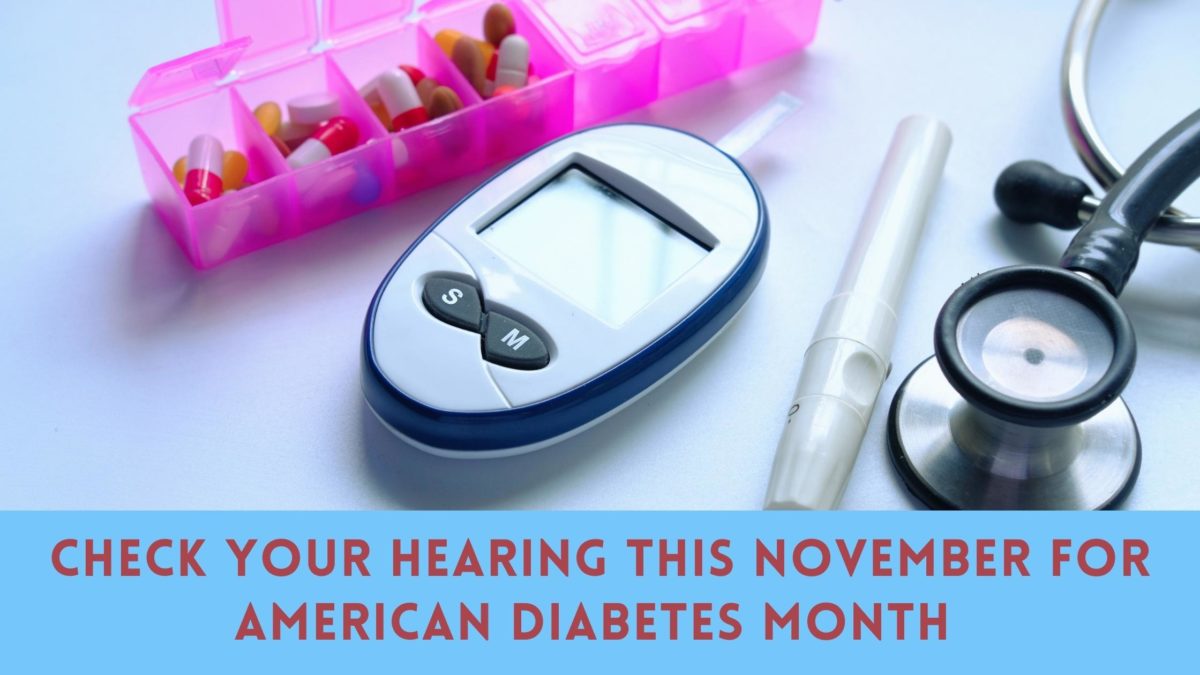Your medical professional probably screens for diabetes at your yearly physical. This is a standard procedure because of the high rates of diabetes within the United States, with more than one in ten persons in this country qualifying as diabetic.
However, it’s less likely that you’ve had a hearing exam within the past five years. And yet, hearing loss is also a leading chronic health issue that impacts the lives of many millions of Americans. However, only two in ten people have had a recent hearing exam while nearly six in ten have undergone a routine eye exam within the last five years. The American Association of Retired Persons (AARP) stated in 2018 that people are more likely to have had a colonoscopy than have their hearing tested!
But, did you know that there is a link between hearing loss and diabetes? November is American Diabetes Month and there’s no better time to schedule your overdue hearing consultation!
Why do we recognize Diabetes Month?
The American Diabetes Association sponsors American Diabetes Month each November to help bring awareness and education on the subject of diabetes. While there is no cure (yet), diabetes can be safely managed with both medications and healthy lifestyle adjustments.
Almost 90 million people in the United States are either living with diabetes right now, or qualify as pre-diabetic. It’s a disease that brings along a wealth of additional health issues like cardiovascular disease, nerve damage, kidney damage as well as harm to the feet and eyes.
The link between hearing loss and diabetes
But recent studies have linked hearing loss with diabetes, too. They found that people with diabetes are significantly more likely to experience hearing loss than people who don’t have the disease. Even pre-diabetes can increase your risk of hearing loss. Of the nearly 90 million people who have prediabetes, data shows that they have a 30 percent higher rate of hearing loss than people who have normal blood sugar levels.
Causes of hearing loss as a result of diabetes
We’re not sure precisely why diabetes increases the risks of hearing loss, but we can theorize that it might be a result of damage to the cells of the inner ear due to varying blood sugar levels. This cell damage associated with diabetes is also the cause of damage to the nerves in the eyes that we call diabetic retinopathy, a condition that ends in blindness that progresses over a number of years.
The role of inner ear cells
The fine cells of the inner ear play an extremely important role in hearing. They are located deep in the ear canal, behind the eardrum. Non-regenerative, they do not repair themselves after being damaged nor do they reproduce if some are lost. They are responsible for receiving the sound information caught by the structure of the ear. From the inner ear cells, sound information is transmitted to the brain’s processing centers.
As cells cease to be productive and less sound information is received in the brain, our experience is to hear less of the sound around us. The early signs of hearing loss can be subtle, but you might notice that having conversations with others becomes more difficult. It might seem like everyone around you is mumbling their words.
Ways to maintain a healthy lifestyle with diabetes
Your medical professional will likely recommend a combination of medications and lifestyle changes to help you manage your diabetes. If you are prediabetic, incorporating changes to your diet and movement habits can prevent the onset of diabetes.
There is no one food to eat that can help manage diabetes, but there are guidelines around the structure of your meals. Aim to have one-half of your plate filled with leafy, non-starchy vegetables. One-quarter of your plate can contain lean proteins like fish or chicken. The final quarter of your plate can be filled with carbohydrates like fruit or potatoes.
As far as movement goes, you don’t have to sign up for a marathon. Just start with a simple walking plan and stick to it. Start out with whatever distance feels manageable and build from there. You can also investigate classes that are movement-based, but don’t fall under traditional fitness instruction. Check out dance, tai chi, or slow yoga classes near you.
If you are ready to address your hearing health, we’re here to help! Contact us today to learn more about our services.

